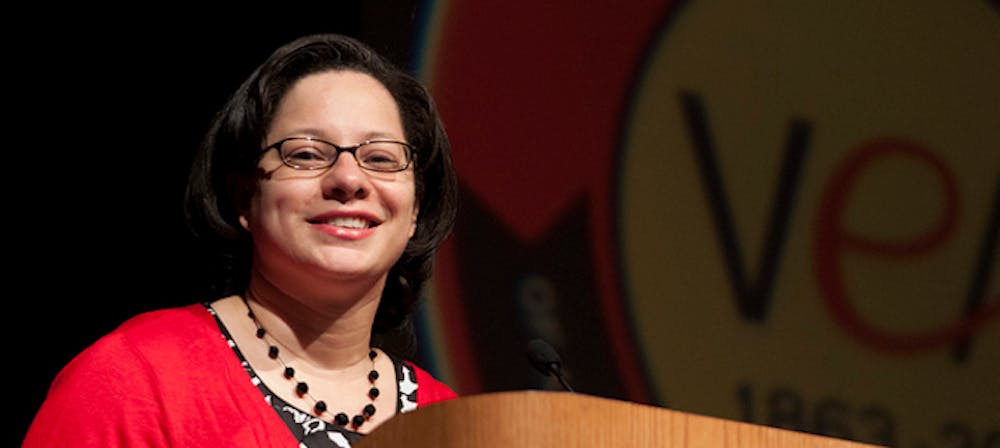Jennifer McClellan, Virginia state senator and University of Richmond alumna, spoke to students on Wednesday about the difficulties of implementing public policies in a society where technology is constantly advancing.
The event took place at 7 p.m. in UR’s new Queally Center for Admission and Career Services as part of the ongoing Sharp Viewpoint Speaker Series for Richmond scholars, titled “Envisioning the Future 50 Years from Now.” McClellan was the second of three total guest speakers for the academic year.
McClellan received her Bachelor of Arts from UR in 1994. After finishing law school at the University of Virginia in 1997, she was officially elected as a member of the Virginia House of Delegates from the 71st District in 2005. She currently serves as a member of the Virginia State Senate for the 9th District of Greater Richmond.
McClellan opened her speech with by stating that even as time had passed, the basis and goals of public policy had not changed.
“Whether it was 50 years ago, or 100 years ago, everybody wanted a safe place to live, an opportunity to succeed, a chance for their children to do better than they did," McClellan said. "That’s the core of what any community wants. That hasn’t changed."
However, she admitted that while certain ideals such as the idea of protesting have remained timeless, others have changed rapidly — especially technology.
McClellan explored how technology has altered business models, property rights, markets and education in ways that complicate established policies.
“They’ve forced us to change how we apply laws that were developed for brick and mortar buildings,” McClellan said, regarding services such as Amazon, and how they are now eclipsing the likes of malls and actual stores.
She explained how unprecedented corporations like Uber and Lyft are now complicating laws centered around the basis of the ‘social contract’ between the employer and the employee.
Given that Uber drivers are technically contractors with their own vehicles instead of official employees, insurance responsibility and claims in the case of accident prove problematic, she said.
McClellan added that there is significant ambiguity as to deciding who must pay for the insurance, and the current policies in place cannot clearly resolve this issue.
Jennifer Cable, professor of music and director of the Richmond Scholars Program, gave her impressions of the senator’s speech.
Enjoy what you're reading?
Signup for our newsletter
“[McClellan] successfully articulated how quickly things could change in the future, and the challenges faced by lawmakers concerning the drafting of laws to address not only issues in the present, but trying to predict the issues of the future,” Cable said.
After the event, Saket Karki, RC ’20, expressed his enthusiasm and his curiosity over what McClellan covered.
“It’s gotten me thinking about how the topics she discussed would apply to the rest of the world. The complexity, and the sheer difficulty that goes into drafting these policies-- I’ve never considered any of it before. That’s what I’ll now take away from this,” Karki said.
During the event, McClellan also explained the relationship that policymakers like herself now held with technology.
“As things change, some very rapidly, we have to come back and say, 'now we have to adjust our laws and regulations to catch up.' However, that's very difficult to do when you’re playing catch up. We don’t have the time to think ahead and say, 'what’s the next big thing that we’re going to have to adjust to,'" McLellan said.
In closing, McClellan expressed concerns with the way the internet has impaired human connection, communication and civility.
“My fear is that we’ve gotten to a point where we’re losing that human connection because we hide behind our technology and only talk to people who validate what we believe,” she said, gesturing towards her tablet.
“Government, corporations, universities — every institution you think of is made up of people," McClellan said. "At the end of the day, if you cannot connect as a human being with another person, you cannot affect change for the public good.”
Contact reporter Arrman Kyaw at arrman.kyaw@richmond.edu. Follow Arrman on Twitter at @ArrmanKyaw.
Support independent student media
You can make a tax-deductible donation by clicking the button below, which takes you to our secure PayPal account. The page is set up to receive contributions in whatever amount you designate. We look forward to using the money we raise to further our mission of providing honest and accurate information to students, faculty, staff, alumni and others in the general public.
Donate Now



